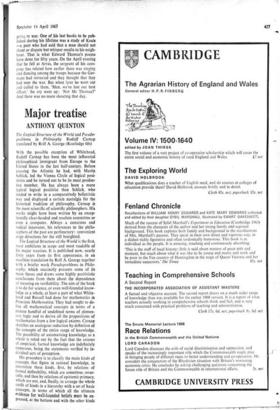Edward Thomas, 1878 -1917
NEVILLE BRAYBROOKE
When Edward Thomas was killed at Arras fifty years ago this month on 9 April 1917, 'a mirror of England was shattered.' The words are those of Walter de la Mare. The two men had been good friends for some years, and when de la Mare's Peacock Pie had come Thomas's way as a critic, he had regarded it as one of the two 'finds' in a reviewer's lifetime. The other was Robert Frost's second book of verse, North of Boston.
Thomas had married while still an Oxford undergraduate and he was a father before he took his degree. He came to London deter- mined to support his family by literary criticism, but soon discovered that this in effect involved him in compiling anthologies, editing standard authors, and writing numerous reviews. Some- times he was compelled to read as many as a dozen books in a week. At one period he toyed with the idea of trying his hand at the novel but decided that he lacked the necessary powers of invention. In prose his talent was essentially that of an essayist, and to his descriptions of the English and Welsh countryside he brought a supreme sensibility. Something that he noticed about George Borrow could be applied to him- self: 'He succeeds not only in evoking things that are very much alive, but in suggesting an artist that is their equal instead of one who, like so many more refined writers, is [merely] a . . . pathetic admirer of things.'
Poverty and hardship frequently forced Thomas to write to order. A book on Marl- borough—'the duke, duke, alas, not the town'—he completed within two months, and, by any stan- dard, it remains a remarkable performance. Insufficient attention has been paid to his ability to work both incredibly fast and accurately. Too often, some of his thirty books have been regarded as no more than competent hack jobs. Keeping constant deadlines for editors had trained him how to concentrate his thought, and there is an immense professionalism about every manuscript which he delivered to a pub- lisher—whether the subject was one of his own choosing as with his book about Richard fel- feries (1909), or a commission as was more usually the case. For instance, his guide to The Isle of Wight (1911) includes not only an admir- able summary of the island's history, but a num- ber of observations that lift it to a level far surpassing the rest of the volumes in the same series. A passage that has stood well the test of time describes the walk along the coast between Bonchurch and Shanklin: In the course of years the landslip has been overgrown with trees and flowers, and become a tumult of twisted oaks among rocks all upheaved and broken into caves and hillocks in a fashion which an old countryman of my acquaintance would call "Gothic." The oaks are twisted as if conceived during the landslip.'
That last sentence, so apparently simple at first sight but so rewarding to ponder, has the intensity of a line in a poem. Moreover, it was Robert Frost who first showed Thomas how much of his prose could be turned into poetry with only a minimum of transposition. And looking back on the 140 poems that he wrote during his last three years ('Did anyone ever begin at thirty-six in the shade?'), time and again there can be recognised that precision and economy of style which distinguished his prose. But with the change to poetry, there comes a development and crystallisation of his vision. His widow has referred to it as 'a kind of spiritual and intellectual fulfilment.' The ambling tone of the earlier essays becomes more concentrated in essence. A poem on 'October' ends: . . . now I might As happy be as earth is beautiful, .Were I some other or with earth could turn In alternation of violet and rose, Harebell and snowdrop, at their season due, And gorse that has no time to be gay. But if this be not happiness,—who knows? Some day I shall think this a happy day, And this mood by the name melancholy Shall no more blackened and obscured be.
'Edward Thomas was a war poet who died in battle.' The yellowing newspaper statement remains true as far as it goes. Indeed when he joined the Artists Rifles in 1916 and Eleanor Farjeon asked him what he was fighting for, he picked up a handful of earth, crumbled it between his finger and thumb, and replied: 'Literally, for this.' Certainly he was a patriot who was proud of his Welsh and English ancestry—and prepared to defend it with his life's blood; but within him was another man whom poetry released—a man who could ques- tion in a quiet, compelling voice the death of a private, once a Wiltshire ploughman, killed in France, or who could look at a bundle of hazel and ash faggots, and muse :
. . . they will never warm me, though they must Light several Winter's fires. Before they are done The war will have ended, many other things Have ended, maybe, that I can no more Foresee or more control than robin and wren.
Such lines offer no violent jingoism, no exag- gerated rhetoric. They are, in their own fashion, the best epitaph. And perhaps, too, the feeling that they articulate is one that has grown more marked as the events of the First World War have receded into the past. For there is about these lines that end 'Fifty Faggots' a prophetic note that seems not only to foreshadow the poet's death, but which reaches out beyond a personal context and speaks for all soldiers still going to war. One of his last books to be pub- lished during his lifetime was a study of Keats —a poet who had said that a man should not shout or dispute but whisper results to his neigh- bour. That is what Edward Thomas's poems have done for fifty years. On the April evening that he fell at Arras, the sergeant of his com- pany has related how earlier there was singing and dancing among the troops because the Ger- mans had retreated and they thought that they had won the war. But when later he went out and called to them, 'Men, we've lost our best officer,' the cry went up : Not Mr Thomas?' And there was no more shouting that day.































 Previous page
Previous page